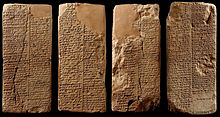En-men-dur-ana
| En-men-dur-ana | |
|---|---|
 The Weld-Blundell Prism is among the oldest, most well-preserved, and better-known versions of the Sumerian King List, and includes the inscription for En-men-dur-ana. [1] | |
| High King of Sumer | |
| Predecessor | En-sipad-zid-ana[2] |
| Successor | Ubara-Tutu |
| King of Sippar | |
| Predecessor | Unknown |
| Successor | Unknown |
| Born | Sippar |
| Sumerian | 𒂗𒉺𒇻𒍣𒀭𒈾 |
| Dynasty | Dynasty of Sippar |
En-men-dur-ana (also En-men-dur-an-ki, Enmenduranki) of Zimbir (the city now known as Sippar) was an ancient Sumerian king, whose name appears in the Sumerian King List as the seventh pre-dynastic king of Sumer. He was also the topic of myth and legend, said to have reigned for 21,000 years.[3][4]
Name
[edit]His name means "chief of the powers of Dur-an-ki", while "Dur-an-ki" in turn means "the meeting-place of heaven and earth" (literally "bond of above and below").[5]
City
[edit]En-men-dur-ana's city Sippar was associated with the worship of the sun-god Utu, later called Shamash in the Akkadian language. Sumerian and Babylonian literature attributed the founding of Sippar to Utu.[6]
Myth
[edit]A myth written in a Semitic language[7] tells of Emmeduranki, subsequently being taken to heaven by the gods Shamash and Adad, and taught the secrets of heaven and of earth. In particular, Emmeduranki was taught arts of divination, such as how to inspect oil on water and how to discern messages in the liver of animals and several other divine secrets.[8][9][10][11][12][13]
See also
[edit]References
[edit]- ^ Ashmolean 2017.
- ^ Black et al. 2006.
- ^ "The Sumerian king list: translation". etcsl.orinst.ox.ac.uk. Retrieved 2021-07-04.
- ^ "4. Ancient Near Eastern Context", Toward a Poetics of Genesis 1-11, Penn State University Press, pp. 122–230, 2013-05-06, doi:10.1515/9781575066943-006, ISBN 978-1-57506-694-3, retrieved 2023-03-11
- ^ A. R. George. Babylonian topographical texts. p 261.
- ^ James B. Pritchard. Ancient Near Eastern Texts Relating to the Old Testament. 3rd ed. pp 43, 164, 265, 270, 271.
- ^ Enmenduranki is on the Sumerians Kings List. The Sumerians are Non-semitic.
- ^ Robert Alter. Genesis. p. 24
- ^ John W. Rogerson and Philip R. Davies, The Old Testament World. p 203
- ^ Wilfred G. Lambert. Babylonian oracle questions. p 4.
- ^ Wilfred G. Lambert, Enmeduranki and Related Material. Journal of Cuneiform Studies. Vol. 21, Special Volume Honoring Professor Albrecht Goetze (1967), pp. 126-138
- ^ J. J. Collins. The apocalyptic imagination: an introduction to Jewish apocalyptic literature. pp 44-47
- ^ I. Tzvi Abusch, K. van der Toorn. Mesopotamian magic: textual, historical, and interpretative perspectives. p24.
Sources
[edit]- Ashmolean (2017). "Sumerian king list". Ashmolean Museum. Retrieved 2021-08-02.
- Black, Jeremy Allen; Baines, John Robert; Dahl, Jacob L.; Van De Mieroop, Marc (2006) [c. 1900–1600 BC]. Cunningham, Graham; Ebeling, Jarle; Flückiger-Hawker, Esther; Robson, Eleanor; Taylor, Jon; Zólyomi, Gábor (eds.). "The Sumerian king list". Faculty of Oriental Studies. Electronic Text Corpus of Sumerian Literature (ETCSL) (in Sumerian). Translated by Jacobsen, Thorkild Peter Rudolph; Glassner, Jean-Jacques; Römer, Willem H. Ph.; Zólyomi, Gábor (revised ed.). United Kingdom of Great Britain and Northern Ireland: University of Oxford. Retrieved 2021-07-31.
After the kingship descended from heaven, the kingship was in Eridug. In Eridug, Alulim became king; he ruled for 28800 years. Alaljar ruled for 36000 years. 2 kings; they ruled for 64800 years. Then Eridug fell and the kingship was taken to Bad-tibira. In Bad-tibira, En-men-lu-ana ruled for 43200 years. En-men-gal-ana ruled for 28800 years. Dumuzid, the shepherd, ruled for 36000 years. 3 kings; they ruled for 108000 years. Then Bad-tibira fell (?) and the kingship was taken to Larag. In Larag, En-sipad-zid-ana ruled for 28800 years. 1 king; he ruled for 28800 years. Then Larag fell (?) and the kingship was taken to Zimbir.
